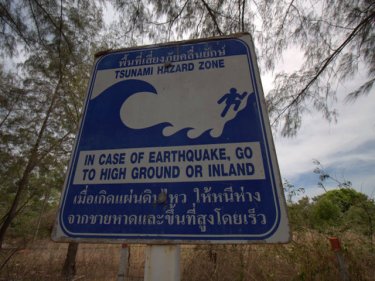THE ineffectiveness of the present travel alert system is highlighted by the revision of the British warning on Thursday. Other nations apparently think we're all still in danger. Who's right? Are Britons now safer than everybody else? What a pathetic system. Please give us something that works for us all.
WHAT can one say about danger warnings that don't work? Phuket has had more than its share lately, with the imprecise and over-protective national travel alerts for Thailand following a Phuket tsunami warning debacle.
The national travel alerts are deeply damaging to Thailand's tourism industry. Phuketwan is prepared to say what Thailand's government appears to be unable or unwilling to say: it's time for a communal approach to these kinds of alerts so that innocent people don't get hurt.
It's time to make the warnings precise and effective.
That, after all, is the aim of travel alerts, to protect people from harm. The difficulty is that these alarms appear to be issued by people who only care for citizens from one particular country. This is, in the 21st century ''we're all in this together'' world, simply the height of 19th century selfishness.
The alerts in the case of the red protest in Bangkok have been so broad and so ridiculous as to call into question the ability of the Bangkok diplomatic corps to diagnose danger.
How would they know? Well, that's something we've never been told.
Is it just guesswork? Probably. And bad guesswork at that.
The result of the current hit-and-miss, scattergun range of national alerts has been extreme damage, amounting to billions of dollars, to Thailand's tourism. The industry has been severely wounded, and by friendly fire.
The most important result, though, will be a shot that rebounds and hits the travel alert system in its own heart.The diplomats' use of a broad and wild approach means that the people they sought to protect are now even less likely to put any faith in these kinds of warnings in future.
So Phuketwan would like to humbly suggest that it's time for all nations to combine and create a travel alert system that is based on fact, not fiction, and that will be trusted as a reliable source by people from every country in the world.
The evidence is that warnings issued by specific individual countries, in an era where intelligent travellers do their own research, are always going to fail.
The warning system - if you can call it that, because it is a combination of so many different warnings - has been widely condemned and is destined to self-destruct.
The tsunami alert on Phuket last month is an object lesson in the kind of disaster prevention system that the international community does not want.
After being told that a tsunami could be on the way, local Phuket authorities simply left it to individual resorts to decide whether to evacuate or not. Just as well it was a false alarm.
Yet the real tsunami of 2004 does provide an object lesson for all nations in the context of a proper travel alert system that works for everyone.
Back in early 2005, as police units from around the world descended on Phuket, there were those nations that figured they should search only for the bodies of victims from their own countries. With 40 countries and 5400 bodies, one can imagine what chaos would have ensued if that idea had been taken up.
Wiser heads prevailed, and the result was a coordinated effort that treated all victims as equal and eventually achieved the most successful international forensic science epic that the world has seen.
The same principle now needs to be applied to travel warnings. All travellers are equally at risk. So are the people who work in the travel industry worldwide, and who innocently suffer as a consequence of the present system.
It was Thailand's turn this time. Where will unnecessary suffering be caused next by the international diplomatic community?
Please, please, combine forces to give us one internationally accepted warning system. Make your warnings factual and accurate. Cooperate to make warnings available in every language, through the Internet. Make them update every hour, every day, all year long.
In so doing, you will reduce unnecessary suffering, earn respect instead of derision, and prove that you are genuinely looking towards one world in the 22nd century.





Travel warnings are as liked as box jellies warnings by the tourist industry. But sometimes you need them. And if you like to think about 2008 then you can see, that trouble could have come to Phuket pretty fast also. Only because the reds did not send their black shirt men here, does not mean, they never thought about it.
Hopefully this dreadful time, where civil war loomed, is over. As then will be the travel warnings. But they were no joke and not spoken out easy. Come on, you know about the intelligence warnings. So no! Phuket was not a sole rock of tranquility in the sea of hysterical madness. It could have become a major target.
When nothing happens it is easy to blame, like with this volcano ashes - as no plane came down it was obvious you did not need the ban in the first place. And a second thought: Maybe the country felt or feared the pain of this travel warnings from the owner of the resorts over the small business to the waiter and tuktuk driver and that may have helped to find a solution.
Travel warnings were reasonable and fine.
Editor: Lena, you've been reading too many travel warnings. Phuket has never been a target. The warnings are grossly exaggerated and for that reason, most people no longer believe them.
Posted by Lena on May 5, 2010 14:56